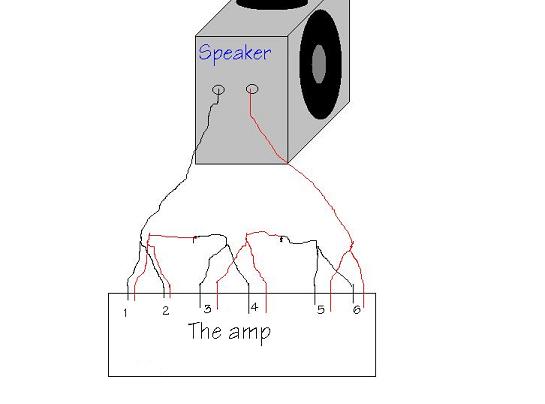Bridging Non-Bridgeable Amps
|
Silver Member Username: Arande2400dB could probably d..., 4000 isnt ev... 100,000dB FU... Post Number: 483 Registered: Dec-06 | Now listen here. I know there are amps that say they are non- bridgeable. I have an old amp (like 2000)that has 6 channels of 50 watt outputs but it's only stable at 6 ohms. If I were to run a bass signal to the amp that were indentical in both channels and ran it so all the channels put out the same signal, would it be possible to wire it like this to keep the load at like 6 ohms or so, but increase the power? I still don't quite understand bridging or amps for that matter. Anyway here's what I was thinking.  By what I've learned that would present about 6ohms to the amp with an 8ohm speaker. I'm not too sure though. Also, I don't really know why an amp is not bridgeable in the first place. |
|
Gold Member Username: Jan_b_vigneDallas, TX Post Number: 9538 Registered: May-04 | . KABLOWEEEE! Amplifiers that do not share a common ground cannot be bridged. Some amplifiers that share a common ground but split the power supply into distinct channels of regulation cannot be bridged since they have different ground potentials. I'm not sure how you came up with your diagram but what you've drawn is a dead amplifier walking. This does not represent a six Ohm load. You are confusing paralleling speakers with doing damage to the amplifier channels. . |
|
Silver Member Username: Arande2400dB could probably d..., 4000 isnt ev... 100,000dB FU... Post Number: 496 Registered: Dec-06 | Thanks for telling me Don't need a blown amp. We can use those channels to power individual loads all the same signal though I hope. |
|
Silver Member Username: Arande2400dB could probably d..., 4000 isnt ev... 100,000dB FU... Post Number: 502 Registered: Dec-06 | I've got another question. If I get a 5 channel amp that can handle DC would it be able to handle bridging? I'm curious about that. |
|
Gold Member Username: Jan_b_vigneDallas, TX Post Number: 9542 Registered: May-04 | . I don't understand "can handle DC". Is this an amplifierthat runs off DC or that lets DC pass through its outputs. Either way, it has nothing to do with whether an amp can be bridged. |
|
Silver Member Username: Arande2400dB could probably d..., 4000 isnt ev... 100,000dB FU... Post Number: 510 Registered: Dec-06 | Oh, well it means that it can handle DC output without getting damaged. It says on the site it can handle "1 ohm, even DC" so basically it can make the driver go out and stay there I guess. |
|
Silver Member Username: Arande2400dB could probably d..., 4000 isnt ev... 100,000dB FU... Post Number: 511 Registered: Dec-06 | Hey I was searching through the Archives and found that one from about 3 years ago where they asked about if they could bridge amps together for big power, you remember that don't you? You know, before you registered? |
|
Gold Member Username: Jan_b_vigneDallas, TX Post Number: 9546 Registered: May-04 | . There were several. You'll have to be more specific. |
|
Silver Member Username: Arande2400dB could probably d..., 4000 isnt ev... 100,000dB FU... Post Number: 515 Registered: Dec-06 | This one! https://www.ecoustics.com/electronics/forum/home-audio/109689.html I hope that helps |
|
New member Username: ThecryptPost Number: 2 Registered: Dec-06 | What's bridging? |
|
Gold Member Username: Jan_b_vigneDallas, TX Post Number: 9549 Registered: May-04 | . Place "amplifier bridging" into a search engine or, alternatively, try "audio definitions" and look under "B". |
Main Forums
Today's Posts- Home Audio Forum
- A/V Receivers Forum
- Amps Forum
- Cassette Forum
- CD Players Forum
- CD Recorders Forum
- DAC & Transports Forum
- DVD-Audio & SACD Forum
- Equalizers Forum
- Integrated Amps Forum
- iPod Docks Forum
- MiniDisc Forum
- Mini Systems Forum
- Digital Music Systems Forum
- Phono Forum
- Preamps Forum
- Speakers Forum
- Subwoofers Forum
- Tuners Forum
- Home Video Forum
- Home Theater Forum
- Car Audio Forum
- Accessories Forum
- All Forum Topics